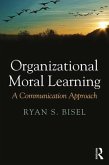Performing Organizational Paradoxes takes a constitutive, process approach to organizational paradoxes. It underscores the performative nature of paradox through underlying dialectical tensions, its sociomaterial foundations, and power features that bring paradoxes to life, sustain them, and enable their transformation.
The book first situates a constitutive approach in the extant organizational paradox literature, by broadening the constitutive approach and addressing the many debates and inaccuracies around it. For the novice, several early chapters devote themselves to considering how paradoxical tensions present themselves, invite responses, and interrelate through their organizing outcomes. For the advanced, latter chapters consider the ubiquity of power and paradox, how bodies escape the quarantine of their paradox narratives, how inventive category work can resist power-imbued paradoxes, and an agenda for future research that challenges scholars to do more on the process side of paradox.
Filling an important gap in the existing literature, this book will be a key resource for scholars and students in the fields of communication, management, educational administration, organizational psychology and any other fields that study organizations.
The book first situates a constitutive approach in the extant organizational paradox literature, by broadening the constitutive approach and addressing the many debates and inaccuracies around it. For the novice, several early chapters devote themselves to considering how paradoxical tensions present themselves, invite responses, and interrelate through their organizing outcomes. For the advanced, latter chapters consider the ubiquity of power and paradox, how bodies escape the quarantine of their paradox narratives, how inventive category work can resist power-imbued paradoxes, and an agenda for future research that challenges scholars to do more on the process side of paradox.
Filling an important gap in the existing literature, this book will be a key resource for scholars and students in the fields of communication, management, educational administration, organizational psychology and any other fields that study organizations.
This is a masterful book, written by two masters of the craft. In Performing Organizational Paradoxes, Fairhurst and Putnam offer what this scholarship has long needed: an extended treatment of paradox as a unique stance on the very constitution of organization. Drawing on their grasp of theory, Fairhurst and Putnam's performativity framework sets forth a unique lens to the notion of organizing. Their perspective reveals important insights regarding the multiplicity of knotted tensions, the sociomateriality of all practice, and the centrality of power. This book holds revelations galore for readers who are willing to follow the pursuit and promise of paradox.
Timothy Kuhn, Chair and Professor of Organizational Communication, Dept of Communication, University of Colorado Boulder
Fairhurst and Putnam offer thought-provoking insights into the nature, responses to and role of paradox in our world. Intricate yet clear, bold yet nuanced, they empower a constitutive approach. Their research unpacks paradox-related phenomena, including a sociomaterial ontology and dialectical dynamics as well as the interplay of power, performativity and narrative sensemaking. Their creativity and rigor will inspire scholars who explore paradoxical tensions across disciplines.
Marianne W. Lewis, Dean and Professor of Management, Carl H. Lindner College of Business, University of Cincinnati, USA
Fairhurst and Putnam are experts in paradox theory. I am always eager to read their work as I continue to learn from it and I was delighted to do so with this book. They have again produced a masterpiece by clarifying and advancing a constitutive approach to paradox. In doing so, they challenge our assumptions, deepen our insights, and invite us to improve our understanding. Anyone who is interested in unpacking how the world operates needs to read this book.
Wendy K. Smith, Dana J. Johnson Professor of Management, University of Delaware, USA
These days, organizational scholars tend to reserve their most original and interesting ideas for academic articles, relegating books to the task of integrating or elucidating previous research. Fairhurst and Putnam's volume breaks with this tradition by offering a trove of stimulating, ground-breaking concepts that greatly enrich paradox literature and push it in new directions. It is a must-read for anyone interested in the study of organizational tensions and contradictions.
Marco Berti, Associate Professor, UTS BUSINESS SCHOOL, University of Technology, Sydney, AUS
Timothy Kuhn, Chair and Professor of Organizational Communication, Dept of Communication, University of Colorado Boulder
Fairhurst and Putnam offer thought-provoking insights into the nature, responses to and role of paradox in our world. Intricate yet clear, bold yet nuanced, they empower a constitutive approach. Their research unpacks paradox-related phenomena, including a sociomaterial ontology and dialectical dynamics as well as the interplay of power, performativity and narrative sensemaking. Their creativity and rigor will inspire scholars who explore paradoxical tensions across disciplines.
Marianne W. Lewis, Dean and Professor of Management, Carl H. Lindner College of Business, University of Cincinnati, USA
Fairhurst and Putnam are experts in paradox theory. I am always eager to read their work as I continue to learn from it and I was delighted to do so with this book. They have again produced a masterpiece by clarifying and advancing a constitutive approach to paradox. In doing so, they challenge our assumptions, deepen our insights, and invite us to improve our understanding. Anyone who is interested in unpacking how the world operates needs to read this book.
Wendy K. Smith, Dana J. Johnson Professor of Management, University of Delaware, USA
These days, organizational scholars tend to reserve their most original and interesting ideas for academic articles, relegating books to the task of integrating or elucidating previous research. Fairhurst and Putnam's volume breaks with this tradition by offering a trove of stimulating, ground-breaking concepts that greatly enrich paradox literature and push it in new directions. It is a must-read for anyone interested in the study of organizational tensions and contradictions.
Marco Berti, Associate Professor, UTS BUSINESS SCHOOL, University of Technology, Sydney, AUS









